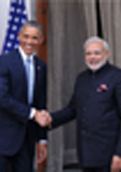India-US Relations: On the Upward Trajectory
The foreign policy establishment can justifiably feel upbeat with the results of the Modi-Trump meeting, which have been most gratifying especially given the uncertainties in the run-up to the visit.
- Ashok Sajjanhar
- June 30, 2017














